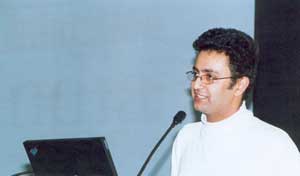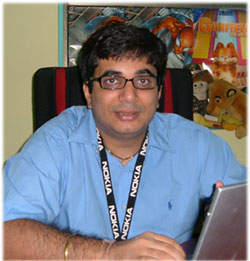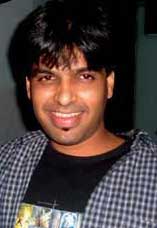Day 2 : Session 2

One industry that has really made its mark in India over the past 18 months has been the gaming industry. The recent news of Nasdaq listed Chinese gaming major TOM accquiring an 81% stake in Indiagames for 17.73 Million US Dollars is just an indication of things to come.
Many argue that Game development shouldn’t be considered as an ancillary activity for an animation studio. The skill sets and competencies required in this segment are quite different.
The head honchos of the top 4 game development studios in India, Indiagames’ Vishal Gondal, Paradox’ Anurag Khurana, Dhruva’s Rajesh Rao and Milestone’s Sachin Naik took part in the session ‘Gaming Challenges in India’
Nothing succeeds like success. The spunk and zing with which the young leaders of the Indian game development industry spoke and made presentations was a clear indication that they had arrived and how!
It wont come as a surprise if VCs looking at the animation sector tilt their focus towards this fast growing field. VCs who swear by the BPO model however ought to note that the success of these studios can be more attributed to their clever cashing in on accquired and owned IP.
Opening the session, Anurag Khuarana (Session chair) remarked,”2 months ago Microsoft launched HALO 2, The game did business of US Dollars 125 million in just 24 hours”
Is game development a part of the entertainment business just as film making?
Dhruva’s Rao compared game development with movie making. Listing the various processes involved in game development he asked the audience to compare those with the processes involved in film making. A director who has the overall vision – story writer – cinematographer – music director – design – visual look – technology to drive the game – AI – Physics – Sound
Milestone’s Naik however pointed out that, “Certain genres of games have very little to do with story – like sport based games – football, hockey coccer and so on. Some are more independent of story they tend to be process driven”
Indiagames’ Gondal remarked, “We look at our business as entertainment. We are in the business of selling interactive entertainment. We don’t want people to take alchohol, drugs or smoke, we want them to get high on our games!!”
“No major entertainment company in the world gets any substantial revenues from services” : Vishal Gondal

“With TOM we now have a big access to the chinese market!” began Gondal. “Over the past year, gaming has suddenly become the new buzz word. Entertainment media, financial media, business, VCs, educators all have been showing a great deal of interest in it. There have been a lot of big numbers being thrown in about gaming. I would request you to discard these numbers. In India we are starting from ZERO. All these numbers are simply distracting. And we can grow fast, 5 years back China too was zero in gaming” he added.
Continuing from where Kireet and team had left the previous day, Gondal made a strong case for IP and for moving up the value chain.
“Everything is about IP. A small company based in holland (Endemol) is now worth billions just making a few game shows (Fear Factor – Big Brother).The more you are away from the value chain, the more you are at a huge risk. Because in services the only way you can increase revenues is by adding people.We have to disassociate ourselves with low end service work” added Gondal.
Interestingly Gondal also mentioned that they were looking to recruit 150 people.
In a sharp contrast to those who talk about lack of opportunity, Gondal said that India has the right eco system.
India has the right eco system.
– Multiple financing options
– Access to best creative and technical talent
– Lakhs of consumers
– Consumers who are willing to pay Rs150 for a game download
– Access to markets
“People with the disposable income do not have the time and people with the time do not have disposable incomes” : Sachin Naik
“Developing Games is an expensive proposition” began Sachin, “Currently developing a game costs around 3-5 million US Dollars, with the arrival of next gen gaming consoles, the costs will reach around between 5-15 million US Dollars” he added
He pointed out some of the challenges that game development studios in India faced and also listed a few recommendations.
Taking the challenge!
Milestone Interactive Business Development Head Sachin Naik
Challenges In India
 – Social, cultural & economic barriers
– Social, cultural & economic barriers
– Gaming is an isolated activity, not yet socially recognised
– High piracy , not enough investment
– Limited product development experience in the games space
– Few organised serious players
– Competition from China : Huge market, huge gaming culture and a lot more eveolved game developers
– Competition from Russia, East Europe (Proximity to europe) Europe is a bigger market for gaming than USA.
– Competition from South East Asian neighbours
– If we continue to play the cost game we will eventually get beaten
Game develoment cannot be looked at as an ancillary activity for an animation studio.
Recommendations
– Develop the local market – Anti Piracy – Localisation, Indian Games, Taxes etc
– Creation of an SIG under NASSCOM on gaming
– Participation in Industry events, trade delegations
– Industry / Academia partnership
“Quality consistency & reliability define your game studio rating” : Rajesh Rao
“Sell only what you can deliver ”
Dhruva Interactive CEO Rajesh Rao
Dhruva Interactive CEO Rajesh Rao informed that the development of its online gaming title Pool on the Net was nearing completion. “The game is a Micro transaction driven model for gaming over the net. Hopefully the beta testing will start by next quarter. This product will help us learn a lot of lessons and prepare for MMOG (Massive Multi Player Online Gaming)” informed Rajesh.
In his presentation Rajesh shared 5 tips for building a great game studio.
5 tips for building a great game studio
– Your team is your company.
Put most of your energy into nurturing a great team and a work culture. Recruit people with right attitude and passion.
– Have a quality philosophy that drives excellence.
The consumer has an access to a global portfolio of content. It takes time to develop a quality philosophy.Quality of processes are equally important.
– Ensure knowledge sharing across teams and constantly work on enhancing skills. The extent of domain knowledge that is required for the PC and console is amazing. PC & Console is a sparate field as compared to mobile games. Mobile Games are a new phenomena growing out of a new audience. Console games have teams of 60 -70 people working together for 2 years
– Timing of games is important.
35% of games in US get sold during X’mas
– Sell only what you can deliver
The quality of your work is the most important thing. But equally important is staying up to the delivery commitment that you give.Very often studios use their best teams to some up with pilots and then they ramp up after getting projects passed.The industry is very unforgiving.
“Simpler games work in the mass market. Tease the market with the games they can adapt to.To grow, game dev studios need to constantly foster and create teams” stated Rajesh.
“Quality consistency & reliability define your game studio rating.A lot of studios like to work with us because we are reliable and consitent with our deliveries” he concluded.
